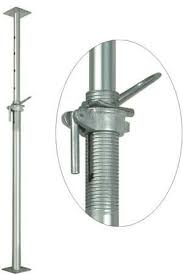Dec . 04, 2024 16:03 Back to list
Manufacturers of Circular Formwork for Structural Columns and Construction Solutions
Circular Formwork Columns An Overview of Manufacturers
Circular formwork columns are essential components in modern construction, particularly in projects that require robust structural performance and aesthetic appeal. The use of circular columns facilitates the distribution of loads and enhances the durability of buildings. In recent years, the demand for these structures has surged, leading to the emergence of numerous manufacturers specializing in circular formwork systems. This article explores the design features, benefits, manufacturing processes, and notable manufacturers of circular formwork columns.
Design Features and Benefits
Circular formwork, as the name implies, is designed to create round or cylindrical concrete structures. One of the primary advantages of using circular columns is their excellent load distribution capabilities. Unlike square or rectangular columns, circular columns can efficiently transfer load to the ground, minimizing stress concentrations. This geometrical advantage aids in reducing the amount of material required, ultimately leading to cost savings.
Additionally, circular columns contribute significantly to the aesthetic appeal of structures. Architects often opt for circular designs to create visually interesting façades and spaces, as they offer a sense of fluidity and organic integration within the built environment. The versatility of circular formwork makes it suitable for various applications, including residential buildings, commercial complexes, and civic structures.
Manufacturing Processes
The manufacturing of circular formwork columns involves several key processes. The initial step is the design phase, where engineers and architects work together to establish the dimensions, load-bearing capacities, and specific requirements for the columns. Once the design is finalized, the materials are selected. Commonly used materials for circular formwork include plywood, steel, and fiberglass, which offer strength and durability.
The next phase is the fabrication of the formwork. This involves cutting and shaping the selected materials to match the design specifications. Modern manufacturers employ advanced technologies such as CNC cutting, laser technology, and automated assembly processes to ensure precision and efficiency. After the formwork is constructed, it undergoes a surface treatment process to enhance its durability and resistance to concrete's corrosive properties.
Finally, the formwork is assembled on-site, where concrete is poured into the circular molds. After curing, the formwork is removed, revealing well-formed, cylindrical columns ready to support the structure.
circular formwork columns manufacturers

Leading Manufacturers in the Industry
Several manufacturers have established themselves as leaders in producing circular formwork columns, each offering a range of products tailored to different construction needs
.1. PERI Group One of the world's largest manufacturers of formwork and scaffolding systems, PERI offers innovative circular formwork solutions that are adaptable and efficient. Their products are widely used in major construction projects, ensuring high-quality results and reduced labor costs.
2. Doka Known for their advanced formwork technology, Doka provides comprehensive circular formwork systems that cater to the unique demands of various construction projects. Their emphasis on safety, ease of use, and cost-effectiveness sets them apart in the industry.
3. Altrad Group Altrad specializes in providing formwork solutions that enhance productivity and safety. Their circular formwork products are favorably regarded for their strong structural performance and ease of handling, making them popular among contractors globally.
4. Lithoform A company focusing on niche markets, Lithoform offers custom circular formwork solutions designed specifically for unique architectural styles. Their collaboration with architects ensures that each product meets the creative and functional requirements of the project.
Conclusion
The increasing demand for circular formwork columns reflects the evolving landscape of the construction industry, where efficiency, design, and sustainability are paramount. Through the innovative manufacturing processes employed by leading manufacturers, the construction sector can benefit from stronger, more aesthetically pleasing structures. As technology advances, we can expect to see even greater developments in circular formwork systems, further enhancing their role in modern architecture and construction. Whether for high-rise buildings or intimate residential projects, circular formwork columns are poised to play a critical role in shaping the skylines of the future.
-
High-Quality U Head Jack Scaffolding – Reliable Scaffolding Jack Head Manufacturer & Factory
NewsJul.08,2025
-
High-Quality I Beam H20 Leading Timber Beam H20 Material Factory, Exporters & Manufacturers
NewsJul.08,2025
-
High-Quality Powder Coating Steel Formwork - Durable & Corrosion Resistant Solutions
NewsJul.07,2025
-
Inclined Column Formwork Supplier – Durable & Precise Solutions for Unique Structures
NewsJul.07,2025
-
High-Quality Water Stop Solutions Trusted Water Stop Company & Suppliers
NewsJul.07,2025
-
High-Quality Formwork Material Supplier Reliable Manufacturer & Factory Solutions
NewsJul.06,2025